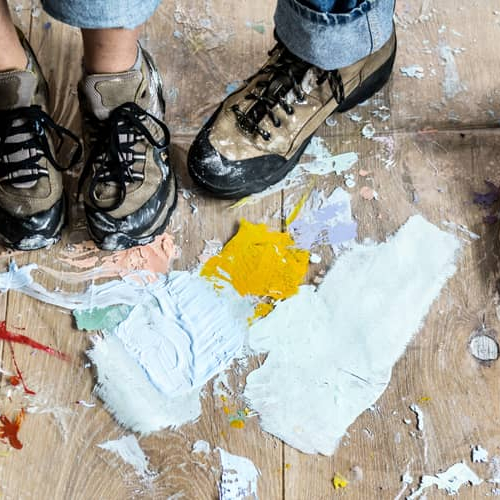Buying a house with mold: What you need to know
Contributed by Karen Idelson, Tom McLean
Apr 22, 2025
•7-minute read
Buying a home is an exciting milestone but can also come with challenges, including finding mold. While mold might concern you, it doesn’t have to be a dealbreaker. With the proper knowledge and approach, you can navigate this situation confidently.
In this article, we’ll provide helpful insights on identifying mold growth, understanding its potential impact, and exploring your options for addressing it to ensure you make an informed decision about handling it.
How to identify mold in a house
Before buying a home, getting a home inspection is a good idea to get a home inspection. Home inspectors can identify mold issues by exploring mold-prone areas and recognizing signs of moisture buildup.
You can also identify potential mold problem areas on your own. Look for moisture-prone areas, such as leaks in plumbing or roofing, basements, water-damaged windows or doors, warped walls or floors, and water stains. Allergy symptoms, like runny noses or itchy eyes, also may signal mold presence.
Look for visible mold growth, such as furry, black stains or black, white, green, or brown specks. A musty, earthy smell may also indicate hidden mold behind carpets, wallpaper, or cabinets.
While testing for mold is usually unnecessary, consider it if you’re unsure whether all mold has been removed, if you suspect hidden mold, or if you’re uncertain if unresolved health issues may be related. Hiring a professional may be necessary to test and clean the home before you move in.
The risks of buying a house with mold
There are many risks associated with buying a house with mold problems. Understanding the risks can help you determine your next steps.
1. It can cause health problems
The most significant risk of buying a house with mold is that mold exposure can cause health problems, especially if there is black mold. While not everyone is affected by mold exposure, those who are could have a severe reaction.
Common symptoms of mold exposure include:
- Congestion or a runny nose
- Lung irritation
- Sore throat
- Coughing
- Difficulty breathing
Currently, there are no tests available that show when and where you were affected by mold, so knowing if there is mold in your surroundings is important if you or your family show symptoms.
2. It stains
Mold is also harmful to your home. Besides the health issues it can cause, it’s unsightly. Mold usually appears in homes in various colors, including black, green, and brown, and the stains it causes are usually tough to remove. If a moldy area covers more than 10 square feet, it’s recommended that you consult with a professional for removal.
Small amounts of mold may be removed from indoor surfaces using a diluted white vinegar solution. Bleach is often recommended for larger areas of mold or areas with stubborn stains. In either case, it’s important to wear protective gear while cleaning mold. If caught quickly, bleach may remove mold stains, but other methods may be necessary if the stains remain there for a while or are in hidden areas.
3. It can severely damage your home
Mold can grow in unexpected areas like HVAC systems, air ducts, and carpeting. If the mold grows in the air ducts, it spreads throughout the home, worsening the spread and increasing the risk to your family members.
If the mold growth is severe, it can cause thousands of dollars in damage and even make systems, such as the HVAC system, stop working. Depending on the damage, it can lower the property value of your home.
4. It’s expensive to remove
Dealing with mold isn’t cheap. First, you need a mold inspection to confirm the mold’s presence and create a mold remediation plan. A qualified mold inspector will tell you the type of mold in the house and help you determine how best to fix it.
The cost to remove mold can vary, depending on where in the home it’s located, the type of mold, and the kind of remediation necessary, which can involve a simple treatment or demolition of the area where the mold is located. As of 2025, remediation by a professional generally ranges from $1,500 to $9,000, with the average around $3,500.
5. It’s usually the result of another problem
Mold growth usually occurs because of a leak in the house. For example, if mold is present in the basement, it could be caused by a pipe leaking in the house. Figuring out where the problem is and what needs to be done to fix it can be expensive and time-consuming. If the problem is complicated, it could also affect other areas of the home.
6. Mold can smell
One of the telltale signs that you have mold is a musty smell in the air. You also might consider the air dank or earthy. It might not be as big of a job if it’s a mild smell. If the smell is overpowering, it’s a serious issue that might quickly affect the entire house and require professional care.
When to walk away from a house with mold
These telltale signs should have you looking for another home fast:
- The house fails all inspections because of mold growth, especially if there are foundation issues.
- The seller either lacks the money to cover the cost of mold remediation and removal or does not want to spend the money to fix it.
- The seller doesn’t have the time or seem to care about fixing the mold issues.
You should only consider buying a home with mold issues when the damage is limited in scope, and the seller is willing to fix the problem, especially if they were unaware the home had mold issues.
Buying a home with mold: FAQs
Buying a home that has mold is a big deal. Here are answers to common questions about mold in a house you’re considering buying.
Who is responsible for the cost of mold removal?
The responsibility of mold removal is more about disclosing its presence versus paying for mold remediation. Sellers are responsible for disclosing any issues with the home, including mold. If a seller knew about the mold issues and didn’t reveal them, they could face legal consequences. Mold removal typically costs between $10 and $25 per square foot. If the seller doesn’t have the time to take care of a mold problem, they may give the buyer a credit at closing to cover the cost but not do the work. Other sellers don’t want to cover the cost and consider it the buyer’s responsibility. However, in some states, the seller is responsible for the cost, so it depends on where you live.
What causes mold in a house?
Mold is often caused by excess moisture in the house. This is usually caused by a leaking pipe, a leaking roof, severe flooding, or dark, moist areas that give mold plenty of room to grow.
Can a house be condemned for mold?
A few areas of mold growth aren’t any reason to condemn a home, but if there are too many infested areas of the house, there is a chance it could be condemned.
What happens if I find mold after buying a house?
If you find mold after buying a house, contact a mold inspector. A professional can tell you if mold exists, what type it is, and what the best course of action is. Professional mold removal isn’t always necessary, especially if it’s surface mold that can be cleaned with bleach. However, it’s always best to be safe rather than sorry when determining the right steps.
How do I prevent mold in the future?
Limiting humidity levels in the home is the key to preventing mold growth. It’s also important that you stay on top of home maintenance tasks, checking pipes regularly for leaks, having the roof inspected annually, and keeping an eye on the basement and any new water spots or wet areas that could signify a leak somewhere in the house that could cause mold growth.
You can help prevent mold with the aid of certain appliances and systems and careful monitoring in areas of your home:
- Dehumidifiers: Dehumidifiers remove excess moisture from the air by drawing it in from the room and passing it over cold coils. You can purchase mobile or whole-house dehumidifiers to control moisture levels and prevent mold from growing.
- Exhaust fans: Exhaust fans are familiar in kitchens and bathrooms and can remove stale or muggy air from your home. Exhaust fans draw out moisture and deliver fresh air from outside.
- Dryer vents: Dryer vents carry heated, moist air out of your drying clothing and expel it outside, cutting down on the moisture buildup in your laundry room and the rest of your home.
- Heating and cooling systems: Heating and cooling systems can prevent mold by controlling moisture and improving ventilation.
The bottom line: When mold is a dealbreaker
You can identify, treat, and remedy mold issues yourself. Remember that not all mold is dangerous, and it’s possible to remove it yourself with readily available cleaners.
However, if an inspector reveals extensive mold growth or water damage, the mold is dangerous or difficult to remove, or the seller won’t pay for mold remediation or disclose the problem, you may want to walk away from the purchase.
Ready to take the next step in your home-buying journey? Getting pre-approved for a home loan is a great way to gain confidence in your budget and streamline the process. Start today and get one step closer to owning the home of your dreams.

Melissa Brock
Melissa Brock is a freelance writer and editor who writes about higher education, trading, investing, personal finance, cryptocurrency, mortgages and insurance. Melissa also writes SEO-driven blog copy for independent educational consultants and runs her website, College Money Tips, to help families navigate the college journey. She spent 12 years in the admission office at her alma mater.
Related resources

7-minute read
How to finance a house renovation: A guide
Are you considering making home improvements, but you want to find the right loan? Here’s how to finance a house renovation, including cash-out refinancin...
Read more

9-minute read
The final walk-through: Checklist of what to look for
Our final walk-through checklist can help secure your peace of mind before closing. Verify repairs and ensure your new home is move-in ready.
Read more
9-minute read
Selling a house as is: What to know
Learn what it means to sell your house as is, the pros and cons, and how to attract serious buyers without making costly repairs.
Read more